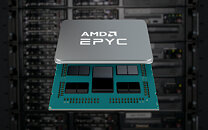- Joined
- Aug 19, 2017
- Messages
- 2,260 (0.92/day)
AMD (NASDAQ: AMD) today announced the expansion of the AMD EPYC processor footprint within the cloud ecosystem, powering the new Oracle Cloud Infrastructure (OCI) E4 Dense instances. These new instances are part of the Oracle Cloud VMware Solution offerings, enable customers to build and run a hybrid-cloud environment for their VMware based workloads.
Based on 3rd Gen AMD EPYC processors, the new E4 Dense instances expand the AMD EPYC presence at OCI and are made to support memory and storage intense VMware workloads. The E4 Dense instances utilize the core density and performance capabilities of EPYC processors to provide customers a fast path to a cloud environment, enabling similar performance and advanced security features through enabling the AMD Secure Encrypted Virtualization (SEV) security feature for VMware workloads that they have on-premises.

"We've experienced the fantastic capabilities of AMD EPYC processors with our E3 and E4 compute instances, and now with E4 Dense, we're expanding EPYC into the hybrid cloud environment for our customers that need flexibility for size, storage and memory performance for VMware solutions," said Bev Crair, senior vice president, compute, Oracle. "In simple terms, the E4 Dense instances and AMD EPYC processors help customers take full advantage of industry-leading OCI compute shapes with the same familiar and certified VMware tooling on-premises, providing a more effective path to the public cloud."
"AMD EPYC processors provide VMware customers with outstanding performance and enhanced security for VMware vSphere, VMware vSAN, and other VMware offerings," said Krish Prasad, senior vice president and general manager, Cloud Infrastructure Business Group, VMware. "With the support of EPYC processors on Oracle Cloud VMware Solution, our customers can get the capabilities and experience they've had on-premises, in a flexible and performant cloud."
"AMD EPYC processors continue to showcase leading performance, versatility and capabilities across numerous types of cloud workloads and environments," said Dan McNamara, senior vice president and general manager, EPYC Business, AMD. "Now, with 3rd Gen EPYC processors powering this new Oracle Cloud VMware Solution offering, we are opening the door for our customers to create a hybrid cloud offering that provides impressive performance for memory and storage intense VMware workloads, while continuing to deliver the flexibility and security capabilities they have come to expect from EPYC in the cloud."
AMD EPYC Processors Enabling Hybrid Cloud Solutions
With E4 Dense and VMware, customers can now deploy a hybrid cloud environment that is tailored to their specific workload with 32-, 64-, 128- core configurations, that have 3.5x the memory and 3.5x the storage per host when compared with other offerings.
You can read more about the new Oracle Cloud VMware Solution E4 Dense shape in the OCI blog here, where TIM Brasil discusses how the company to moved to the EPYC processor-based instance and achieved 25% faster processing of its customer billing system.
The use of AMD EPYC processors for diverse workloads continues to expand as more cloud service providers are using EPYC processors to power their customers most demanding and intense workloads.
View at TechPowerUp Main Site
Based on 3rd Gen AMD EPYC processors, the new E4 Dense instances expand the AMD EPYC presence at OCI and are made to support memory and storage intense VMware workloads. The E4 Dense instances utilize the core density and performance capabilities of EPYC processors to provide customers a fast path to a cloud environment, enabling similar performance and advanced security features through enabling the AMD Secure Encrypted Virtualization (SEV) security feature for VMware workloads that they have on-premises.

"We've experienced the fantastic capabilities of AMD EPYC processors with our E3 and E4 compute instances, and now with E4 Dense, we're expanding EPYC into the hybrid cloud environment for our customers that need flexibility for size, storage and memory performance for VMware solutions," said Bev Crair, senior vice president, compute, Oracle. "In simple terms, the E4 Dense instances and AMD EPYC processors help customers take full advantage of industry-leading OCI compute shapes with the same familiar and certified VMware tooling on-premises, providing a more effective path to the public cloud."
"AMD EPYC processors provide VMware customers with outstanding performance and enhanced security for VMware vSphere, VMware vSAN, and other VMware offerings," said Krish Prasad, senior vice president and general manager, Cloud Infrastructure Business Group, VMware. "With the support of EPYC processors on Oracle Cloud VMware Solution, our customers can get the capabilities and experience they've had on-premises, in a flexible and performant cloud."
"AMD EPYC processors continue to showcase leading performance, versatility and capabilities across numerous types of cloud workloads and environments," said Dan McNamara, senior vice president and general manager, EPYC Business, AMD. "Now, with 3rd Gen EPYC processors powering this new Oracle Cloud VMware Solution offering, we are opening the door for our customers to create a hybrid cloud offering that provides impressive performance for memory and storage intense VMware workloads, while continuing to deliver the flexibility and security capabilities they have come to expect from EPYC in the cloud."
AMD EPYC Processors Enabling Hybrid Cloud Solutions
With E4 Dense and VMware, customers can now deploy a hybrid cloud environment that is tailored to their specific workload with 32-, 64-, 128- core configurations, that have 3.5x the memory and 3.5x the storage per host when compared with other offerings.
You can read more about the new Oracle Cloud VMware Solution E4 Dense shape in the OCI blog here, where TIM Brasil discusses how the company to moved to the EPYC processor-based instance and achieved 25% faster processing of its customer billing system.
The use of AMD EPYC processors for diverse workloads continues to expand as more cloud service providers are using EPYC processors to power their customers most demanding and intense workloads.
View at TechPowerUp Main Site



